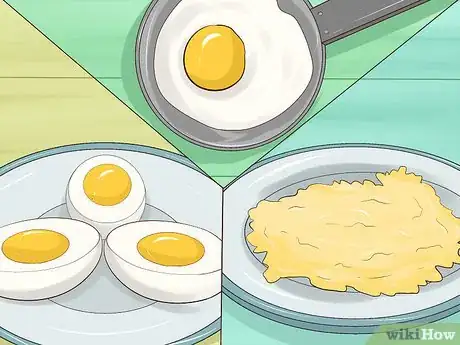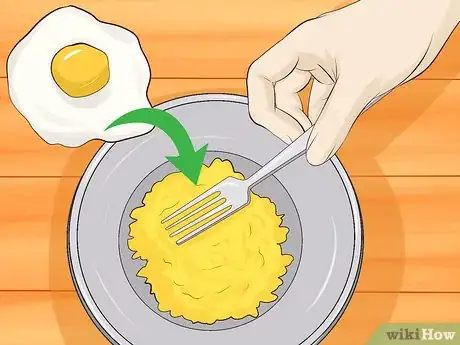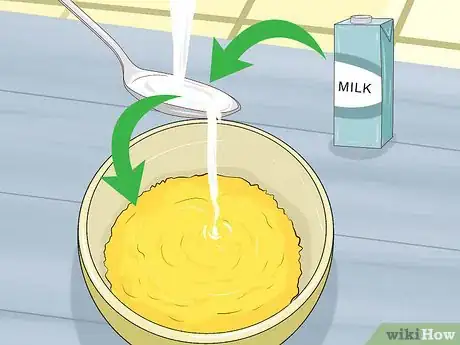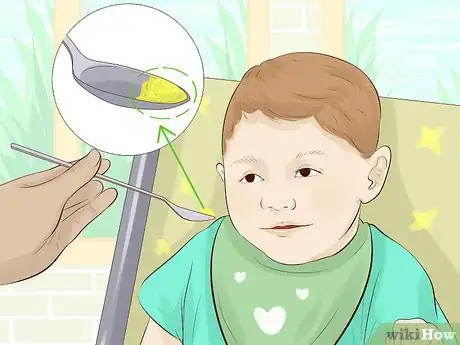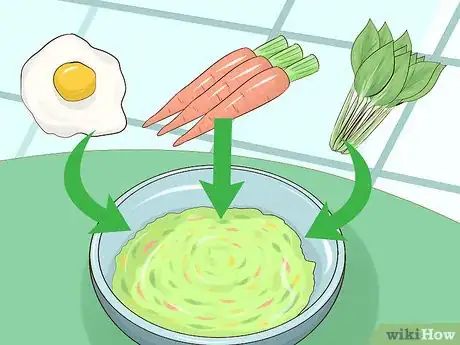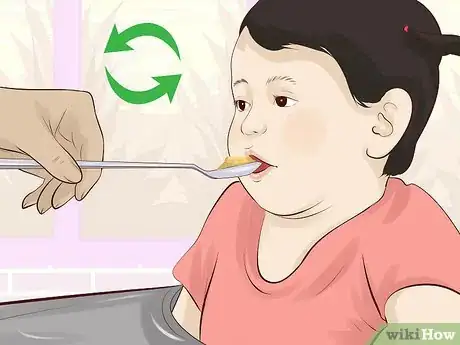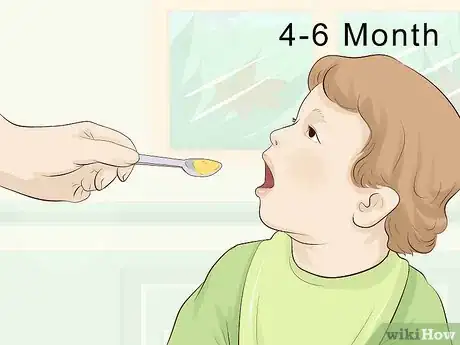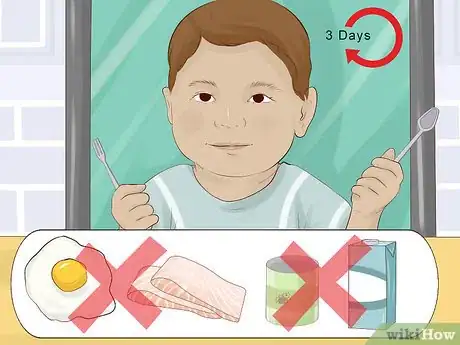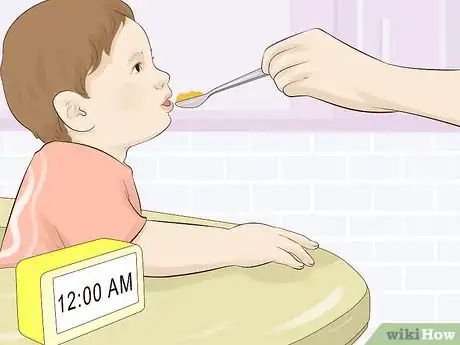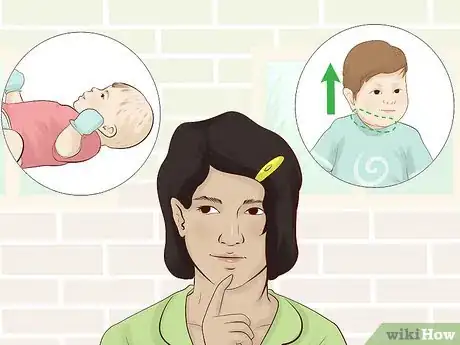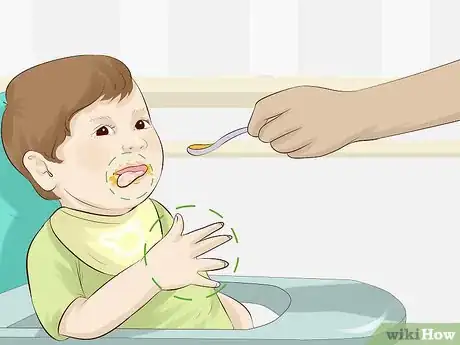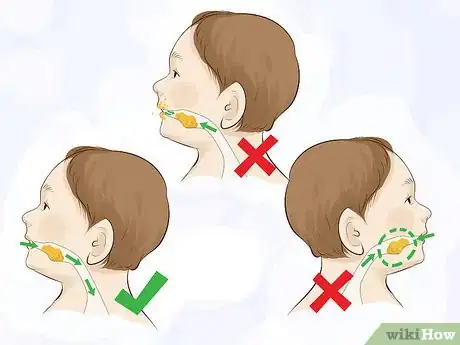This article was co-authored by Corey Fish, MD and by wikiHow staff writer, Amy Bobinger. Dr. Corey Fish is a practicing Pediatrician and the Chief Medical Officer at Brave Care, a pediatric healthcare company based in Portland, Oregon. Dr. Fish has over 10 years of experience in pediatric care and is a member of the American Academy of Pediatrics. Dr. Fish received a BS in Biology from Pacific Lutheran University in 2005, an MD from the University of Washington School of Medicine in 2009, and completed his Pediatric Residency at the University of Texas Southwestern Medical School in 2012.
There are 13 references cited in this article, which can be found at the bottom of the page.
This article has been viewed 49,725 times.
It's exciting to introduce new foods to your baby, but it can be hard to know when and how to offer foods that could cause an allergic reaction, like eggs or peanut butter. Luckily, now we know that introducing these foods earlier may actually help prevent food allergies from developing![1] In fact, you can feed your baby eggs as soon as they are ready to start eating solid foods. Just keep an eye out for any signs of a reaction, like facial swelling, hives, or trouble breathing.
Steps
Egg Preparation
-
1Cook a whole egg using your preferred cooking method. You can hard boil, poach, or scramble the egg, but make sure it’s completely cooked.[2] Raw or undercooked eggs may contain the bacteria salmonella, which can cause your baby to become seriously ill.[3]
- Avoid feeding your baby foods which contain raw eggs, like custards, homemade ice cream, and homemade mayonnaise.
-
2Mash the egg into a smooth puree once it’s cooked.[4] You should be able to easily mash the egg with the back of a fork, but if you prefer, you can place the egg into a food processor and blend it for a few seconds until it’s smooth.
- It’s fine to give your baby the whole egg; there’s no need to separate the yolk from the white.
- There’s no need to season the eggs before you give them to your baby.
Advertisement -
3Add a little liquid to the eggs if you'd like a smoother texture. If you want to thin out the eggs, add 1⁄2 tablespoon (7.4 mL) of milk, formula, or water to the eggs after you’ve mashed them up. Stir the liquid in thoroughly. If you want the eggs to be thinner, add a little more liquid.[5]
- If your baby is just starting to eat solid foods, adding liquid to the eggs will make it easier for them to eat.
-
4Sit your baby upright. Secure your baby in a high chair or ask an adult to hold the baby in their lap. Don’t give your baby solid food while they are lying down, or they might choke.[6]
- This might get messy! Put a shower curtain under the seating area to make cleanup a breeze.
-
5Feed a few small bites of egg to your baby.[7] Using an infant-sized spoon, offer the softened eggs to your baby. Gently place the spoon to their mouth, but do not pour the eggs from the spoon into your baby’s mouth. If your baby is ready to eat solids from a spoon, they will take the food from the spoon.[8]
- You could also offer small pieces of egg to your baby to put in their mouth using their hands, instead of feeding them with a spoon.
-
6Mix the egg into your baby's regular food if they won’t eat the plain egg. If your baby doesn’t seem to like eggs but you’d still like them to be a part of their diet, try mixing a little of the mashed eggs into your baby’s next meal. Eggs blend easily into other mashed and pureed foods.[9]
- Try mixing eggs with pureed carrots, spinach, or chicken, for example.
-
7Keep trying if your baby doesn't eat the egg right away. It’s normal for babies to reject a new food the first few times they try it. Babies’ taste buds develop rapidly, so they may decide they like eggs the next time they try them even if they didn’t eat them the last time they were offered. If your baby doesn’t seem to like the eggs, wait a few days and then try again. [10]
- Of course, sometimes babies and small children will suddenly decide they don’t like a food that they’ve previously enjoyed, especially during the picky toddler years. If this happens, don’t worry—just keep offering the food from time to time.
Allergy Guidelines
-
1Start introducing eggs between 4 and 6 months. Introducing eggs as soon as your baby starts eating solids could help prevent an egg allergy.[11]
- Don’t attempt to introduce solid foods to your baby before they are 4 months old, as their mouth and throat aren’t developed enough to swallow them. The typical age when babies start eating solid foods is closer to 6 months.
- If you want to test if your baby may have an egg allergy without feeding them an egg, you can cook one and hold it to their skin for a few seconds. If any redness or swelling appears, your child may be allergic.[12]
-
2Avoid offering other new foods for 3-5 days after introducing eggs. Although most food allergy symptoms will show up immediately, sometimes they can take a few days to appear. If you introduce several new foods at once, it will be harder to know which food caused the allergic reaction if one appears.[13]
- It’s especially important to avoid feeding your baby other foods that could potentially cause an allergic reaction, including cow’s milk, peanut butter, and fish.
-
3Give the baby eggs during the day so you can observe their reaction. About 2% of children experience an egg allergy, and while most children will outgrow this allergy, it can still produce a dangerous reaction in a small child. Feeding your baby eggs during the day will give you a chance to watch how they respond, and you’ll be more likely to spot any troubling signs of an allergic reaction.[14]
- Signs of an allergic reaction include swelling of the face, lips, or eyes, sore throat, vomiting, hives, or respiratory trouble.[15]
- If you notice any of these signs, stop feeding your baby eggs and call your pediatrician immediately.
- In rare cases, food allergies can lead to anaphylaxis, characterized by trouble breathing, a swollen tongue, or a limp or floppy appearance. If you suspect anaphylaxis, seek emergency medical assistance right away.
Signs Your Baby is Ready for Solids
-
1Wait until your baby is at least 4 months old. Feed your little one breastmilk or formula exclusively for the first 4-6 months of their life. After that time, you can introduce solids gradually. Even if your baby shows an interest in food or seems ready to eat solids before 4 months, it’s best to wait. Don’t worry, your baby is getting all the nutrients they need from breastmilk or formula.[16]
-
2Introduce solids once your baby can sit up by themselves. If your baby can’t support their own head or sit up without your support, it’s too early to start feeding them solids. Stick with breastmilk or formula until your baby’s motor skills are stronger.[17]
-
3Offer your baby food and see if they open their mouth and try to eat it. If your baby opens their mouth when offered food, they have probably been paying attention to you when you eat, and they’re likely eager to try new foods! As long as they meet the other requirements, this is the perfect time to start introducing them to tasty, nutritious foods.[18]
- You may also notice your baby reaching out to grab your food or licking their lips when they see or smell the food you’re eating.
- If your baby is able to grab food and bring it to their mouth, they are likely ready to start trying solid foods.
-
4Make sure your baby can move food from the spoon to their throat. When you first introduce the food, watch carefully to be sure your baby can use their mouth to move the food off of the spoon and to the back of their throat. If their tongue pushes the food out of their mouth, or if the food sits in their mouth and they don’t swallow it, they may not be ready for solids.[19]
Expert Q&A
-
QuestionHow do I introduce eggs to my 7 month old?
 Corey Fish, MDDr. Corey Fish is a practicing Pediatrician and the Chief Medical Officer at Brave Care, a pediatric healthcare company based in Portland, Oregon. Dr. Fish has over 10 years of experience in pediatric care and is a member of the American Academy of Pediatrics. Dr. Fish received a BS in Biology from Pacific Lutheran University in 2005, an MD from the University of Washington School of Medicine in 2009, and completed his Pediatric Residency at the University of Texas Southwestern Medical School in 2012.
Corey Fish, MDDr. Corey Fish is a practicing Pediatrician and the Chief Medical Officer at Brave Care, a pediatric healthcare company based in Portland, Oregon. Dr. Fish has over 10 years of experience in pediatric care and is a member of the American Academy of Pediatrics. Dr. Fish received a BS in Biology from Pacific Lutheran University in 2005, an MD from the University of Washington School of Medicine in 2009, and completed his Pediatric Residency at the University of Texas Southwestern Medical School in 2012.
Board Certified Pediatrician The first time you give your baby eggs, give them just a few bites. In addition to letting their system adjust to the new food, this will also give you time to see whether they demonstrate any symptoms of an allergic reaction, like swelling, trouble breathing, a rash, or hives.
The first time you give your baby eggs, give them just a few bites. In addition to letting their system adjust to the new food, this will also give you time to see whether they demonstrate any symptoms of an allergic reaction, like swelling, trouble breathing, a rash, or hives.
Warnings
- If you notice any signs of an allergic reaction, such as hives or welts; swelling of the lips, eyes, or face; trouble breathing; vomiting; or stomach pain, stop feeding your baby eggs and talk to your child's pediatrician. [20]⧼thumbs_response⧽
- If your baby has difficulty breathing, becomes pale and limp, or their tongue swells, get emergency medical assistance right away, as these could be signs of anaphylaxis, a severe allergic reaction.[21]⧼thumbs_response⧽
References
- ↑ https://jamanetwork.com/journals/jama/fullarticle/2553447
- ↑ https://www.sciencedirect.com/science/article/abs/pii/S0091674910011735
- ↑ https://www.cdc.gov/salmonella/general/index.html
- ↑ https://www.cdc.gov/nutrition/infantandtoddlernutrition/foods-and-drinks/when-to-introduce-solid-foods.html
- ↑ https://www.cdc.gov/nutrition/infantandtoddlernutrition/foods-and-drinks/when-to-introduce-solid-foods.html
- ↑ https://www.llli.org/breastfeeding-info/starting-solids/
- ↑ https://www.cdc.gov/nutrition/infantandtoddlernutrition/foods-and-drinks/how-much-and-how-often.html
- ↑ https://www.health.qld.gov.au/__data/assets/pdf_file/0024/650805/paed_preterm_solids.pdf
- ↑ https://www.allergy.org.au/patients/allergy-prevention/ascia-how-to-introduce-solid-foods-to-babies
- ↑ https://www.cdc.gov/nutrition/infantandtoddlernutrition/foods-and-drinks/picky-eaters.html
- ↑ https://jamanetwork.com/journals/jama/fullarticle/2553447
- ↑ Corey Fish, MD. Pediatrician & Chief Medical Officer, BraveCare. Expert Interview. 17 March 2020.
- ↑ https://www.cdc.gov/nutrition/infantandtoddlernutrition/foods-and-drinks/when-to-introduce-solid-foods.html
- ↑ https://www.allergy.org.au/patients/allergy-prevention/ascia-how-to-introduce-solid-foods-to-babies
- ↑ Corey Fish, MD. Pediatrician & Chief Medical Officer, BraveCare. Expert Interview. 17 March 2020.
- ↑ https://www.ncbi.nlm.nih.gov/pmc/articles/PMC4774553/
- ↑ https://onlinelibrary.wiley.com/doi/epdf/10.1111/mcn.12166
- ↑ https://www.cdc.gov/nutrition/infantandtoddlernutrition/foods-and-drinks/when-to-introduce-solid-foods.html
- ↑ https://www.health.qld.gov.au/__data/assets/pdf_file/0024/650805/paed_preterm_solids.pdf
- ↑ https://www.cdc.gov/healthyschools/foodallergies/pdf/20_316712-A_FA_guide_508tag.pdf
- ↑ https://www.cdc.gov/healthyschools/foodallergies/pdf/20_316712-A_FA_guide_508tag.pdf
About This Article
If you want to introduce eggs to your baby, hard-cook the eggs before you serve them. You can boil, poach, or scramble the eggs as long as the yolk is completely cooked. Mash the eggs with the back of a fork or blend them in a food processor, then add a little liquid to thin out the texture of the eggs. With your baby sitting upright, offer them a small bite of the eggs and wait to see if they eat them before offering more. To learn how to spot signs of an allergic reaction to the eggs, keep reading!
